初中英语牛津译林版九年级上册Unit3《GrammarObject clauses introduced by question words》公开课教案
Unit 3 第3课时 Grammar 九年级英语上册(牛津译林版)
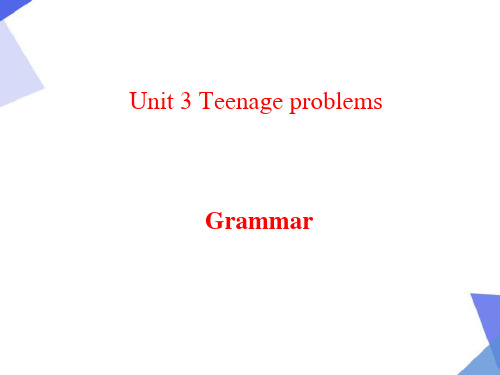
③若宾语从句表示的是客观真理、自然现象、谚语 等,等那么无论主句是什么时态,从句都要用一般 现在时。
He said that light travels much faster than sound. 他说光比声音传播得快得多。 The teacher said one and one makes two. 老师说一加一等于二。
Unit 3 Teenage problems Grammar
(二)连接代词和连接副词引导的宾语从句 我们可用连接代词(who,whom,whose,which, what)或连接副词(where,how,why,when)引导宾语 从句,连接代词或连接副词有具体含义,并在从句中充当成 分,因此不可省略。此时从句部分的语义相当于一个特殊疑 问句。
四、宾语从句有时可转化成“疑问词+动词不定式”结构 如果主句的主语与从句的主语一致,由疑问词引导的宾语从 句就可以转化为“疑问词+动词不定式”结构。 I want to know how I get there. →I want to know how to get there. 我想知道怎样去那里。 I don’t know which sweater I should buy. →I don’t know which sweater to buy. 我不知道该买哪一件毛衣。
二、宾语从句的语序 宾语从句的语序须是陈述语序。 I don’t know what they are looking for.
我不知道他们在找什么。 Could you tell me when the train will leave?
你能告诉我火车什么时候开吗?
三、宾语从句的时态 ①若主句为一般现在时,则宾语从句要根据语境选择所需要 的任何时态。 I know when she will come tomorrow. 我知道明天她什么时候来。 ②若主句为一般过去时,则宾语从句也要用过去的某种时态。 He knew when Tom would come tomorrow. 他知道汤姆明天什么时候来。 He knew where Tom had gone. 他知道汤姆去哪儿了。
牛津译林版-英语-九上-3单元 Teenage problems Grammar
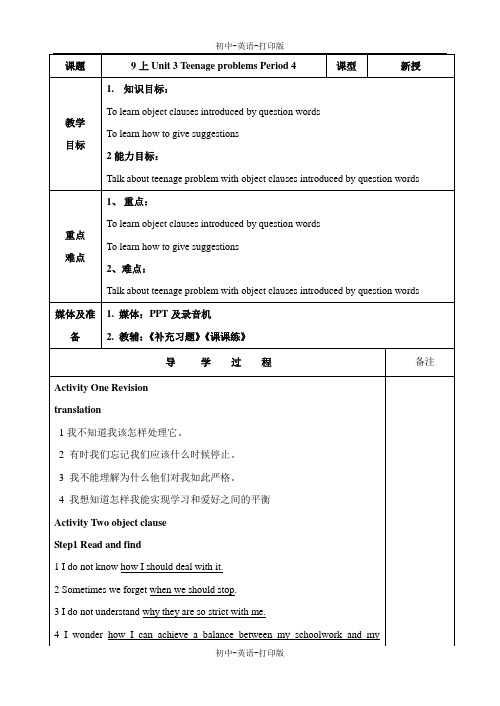
难点
1、重点:
To learn object clauses introduced by question words
To learn how to give suggestions
2、难点:
Talk about teenage problem with object clauses introduced by question words
We give suggestions politely using structures such as
Why not…?
Why don’t you…?
What/How about…?
Let’s….
Shall we…?
Perhapsyou should…
(询问建议的方式,通过让学生回忆归纳,教师需点明的是标点符号和动词形式)
Step1Read and find
1Ido not knowhowIshould deal with it.
2 Sometimes we forgetwhen we should stop.
3 I do not understandwhy they are so strict with me.
4IwonderhowIcan achieve a balance between my schoolwork and myhobbies.
Translation: 1请告诉我,你什么时候去北京。
2 Tom问我放学后我想玩什么。
3他不知道什么时候完成这么多的家庭作业。
4我不知道我弟弟住在哪里。
Homework:
1 finish exercises in period 4
2 preview integrated skills
牛津译林版九年级英语上册Unit 3 Grammar 示范课教案

活动层次
学习理解之感知与注意
效果评价
观察学生回答问题的表现,了解其对阅读部分内容的理解和掌握程度。
环节设计意图:复习本单元阅读部分的内容,激活已知,为后续活动提供语料。
环节二:创设语境,掌握连接代词和连接副词引导的宾语从句的用法。(12 mins)
作业与拓展
1. Write down your classmates’ problems and the suggestions.
2. PreviewIntegrated skills.
环节设计意图:培养学生的分析和总结能力,并加深对知识的理解。
环节四:巩固新知,完成练习。(10 mins)
教师引导学生完成练习,巩固对本节课所学知识的理解和掌握。
教学活动
10.Studentsrewritequestionsbyusing object clauses introduced by question words.
11. Studentscomplete the email using the correct question words.
12. Students complete the conversation using correct structures of giving suggestions.
三、教学目标
通过本课时的学习,学生能够:
1.正确使用连接代词和连接副词引导宾语从句。
2.运用宾语从句来表达自己和他人的问题。
3.总结礼貌地给建议的句型结构,并针对他人的问题给予合适的建议。
4.积极看待生活中遇到的问题,及时求助他人。
四、教学重难点
牛津译林版英语九年级上册Unit 3 Teenage problems Grammar (共31张PPT)

8
Kitty
n. 安静,沉默
I need silence when I’m
studying. I don’t know _w_h_e_r_eI
can find a quiet place.
Peter
I need someone to share
my worries with. I wonder
_w_h_o_/_w__h_o_m_ I should go to
for help. n. 担心,令人担忧的事
9
Amy
I have tried my best, but I don’t
understand w__h_y_ I still get low
marks.
Sandy
My parents often come home very late. Sometimes I don’t know
w__h_e_n_ I will see them.
10
Sometimes I’m careless. I
wonder _h_o__wI can be more
3. I believe that I have made a wise decision, so I won’t change my mind. 4. — I hope that all my dreams can come true.
— If you try your best, they will surely be realized. 5. — May I askif/whether you will come to our party this weekend?
Unit3Period3Grammar课件牛津译林版英语九年级上册

6. Suzy: I often have difficulty expressing myself. Who can tell me ___w_h_a_t____ I should do Work out the rule! The word order in an object clause introduced by a question word should be __d_i_ff_e_r_en_t_f_r_o_m____ (different from, the same as) that in a wh- question.
7. I cannot imagine _w__h_a_t_li_f_e_w_o_u__ld__b_e_l_ik_e__w_i_t_h_o_u_t_h_o_b_b_i_e_s_____.
A3. Millie wants to introduce Mr Friend to her classmates. Help Millie complete her email with the correct question words.
Sandy: (4) _W__h_y__n_o_t__ go and see It’s still early. Millie: OK. But we may get home late. (5) ___L_e_t_’_s___ tell our parents first.
Work out the rule! A suggestion using ____W__h_y_n_o_t_._..___,_W__h_y__d_o_n_’t__y_o_u_.._. , __W__h_a_t_/H__o_w__a_b_o_u_t._..___or _S__h_a_ll_w__e_.._. ends with a question mark. A suggestion using ___L_e_t_’s_._..__ends with a full stop.
牛津译林九年级上册Unit3Grammar
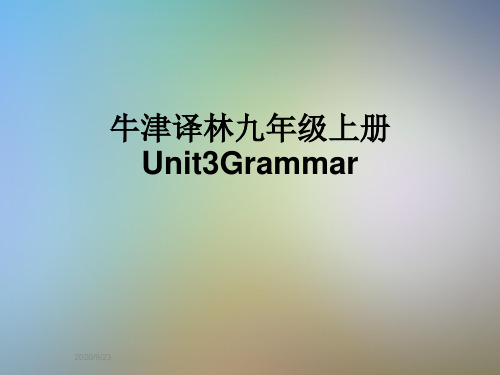
1. Why do I always feel tired in class? 2. How much sleep do we need every day? 3. Which method should I use to solve the problem? 4. Where can we buy a good dictionary? 5. How can I improve my English quickly? 6. Whom should we ask for help? 7. What would life be like without hobbies?
how often it is shown on TV.
when she can watch the program.
__________ who will be the winner. S+V+a question word +a statement.
Object clauses introduced by question words 特殊疑问词引导的宾语从句
(代词)and tenses(时态).
我想知道你最喜欢哪一条领带?
I wonder
Which tie do you like best?
Tip1
➢ Pay attention to the word order.
I wonder
牛津译林版九年级上册Unit 3《Teenage problems》(Grammar)教学设计

牛津译林版九年级上册Unit 3《Teenage problems》(Grammar)教学设计一. 教材分析《牛津译林版九年级上册Unit 3 Teenage problems》主要讨论了青少年时期可能遇到的各种问题,如家庭、学校、朋友以及自我认知等方面。
通过本节课的学习,学生能够掌握一般现在时态的被动语态,以及如何运用一般现在时态进行问题描述。
教材内容贴近学生生活,有利于激发学生的学习兴趣和积极性。
二. 学情分析九年级的学生已经具备一定的英语基础,能够运用一般现在时态进行简单描述。
但部分学生在语法方面仍存在一定的困难,如对一般现在时态的被动语态掌握不扎实。
此外,学生对青少年时期的问题有一定的了解,但可能缺乏对这些问题深度思考和讨论的机会。
三. 教学目标1.知识目标:–能熟练运用一般现在时态的被动语态进行描述。
–掌握与青少年问题相关的词汇和短语。
2.能力目标:–能用英语描述和讨论青少年时期的问题。
–提高学生的团队合作和沟通能力。
3.情感目标:–培养学生对青少年问题的关注和理解。
–引导学生正确面对和处理青少年时期的问题。
四. 教学重难点•一般现在时态的被动语态。
•与青少年问题相关的词汇和短语。
•一般现在时态的被动语态在实际语境中的运用。
•如何在讨论中正确表达自己的观点和情感。
五. 教学方法1.情境教学法:通过设定情境,让学生在实际语境中运用所学知识。
2.任务型教学法:通过完成各种任务,提高学生的实际运用能力。
3.合作学习法:鼓励学生分组讨论,培养团队合作精神。
六. 教学准备1.教学PPT:包括教材内容、语法点讲解、练习题等。
2.教学素材:与青少年问题相关的图片、视频等。
3.分组名单:便于学生进行合作学习。
七. 教学过程1.导入(5分钟)–利用与青少年问题相关的图片或视频,激发学生的兴趣。
–引导学生用英语自由谈论青少年时期遇到的问题。
2.呈现(10分钟)–介绍一般现在时态的被动语态的用法。
–通过例句和练习,让学生掌握一般现在时态的被动语态。
译林版牛津初中英语九年级上册Unit3Grammar课件

Could you tell me what you are doing?
What should we pay attention to when 注意语序 doing the exercises? 总结做题时的应注意点
把下列句子改为含有宾语从句的复合句
2. Which T-shirt should I choose? he He hasn’t decided which __________________________. T-shirt I should choose
(2 points)
把下列句子改写成宾语从句 “Do you help your parents do the dishes after supper?” Wang Yi is asking me. Wang Yi is asking me whether I help my parents do the dishes after supper.
(2 points) ( C ) (2013江苏苏州) --- Philip has gone to New Zealand. --- Oh, can you tell me ________? A. when did he leave B. when he is leaving C. when he left D. when is he leaving
Yang yangyang is asking his dad if/ whether this is a cow ________________________.
Is this a cow? Yang yangyang is asking his dad.
We want to know what they are worrying about ______________________________.
译林牛津九年级上unit3知识点
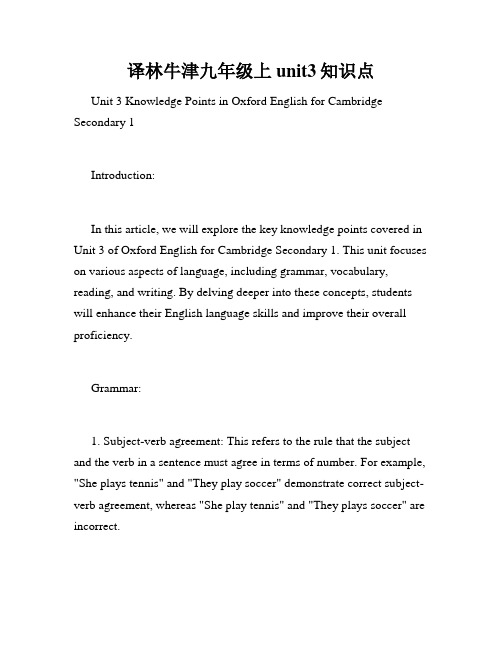
译林牛津九年级上unit3知识点Unit 3 Knowledge Points in Oxford English for Cambridge Secondary 1Introduction:In this article, we will explore the key knowledge points covered in Unit 3 of Oxford English for Cambridge Secondary 1. This unit focuses on various aspects of language, including grammar, vocabulary, reading, and writing. By delving deeper into these concepts, students will enhance their English language skills and improve their overall proficiency.Grammar:1. Subject-verb agreement: This refers to the rule that the subject and the verb in a sentence must agree in terms of number. For example, "She plays tennis" and "They play soccer" demonstrate correct subject-verb agreement, whereas "She play tennis" and "They plays soccer" are incorrect.2. Present simple tense: This tense is used to express general truths, habits, and routines. It is formed by adding an -s or -es to the base form of the verb in the third-person singular. For instance, "He goes to school every day" and "The sun rises in the east."3. Adjectives and adverbs: Adjectives modify nouns, while adverbs modify verbs, adjectives, and other adverbs. Understanding their distinctions helps in constructing meaningful sentences. For example, "She is a quick runner" (adjective modifying the noun "runner") and "She runs quickly" (adverb modifying the verb "runs").Vocabulary:1. Synonyms and antonyms: Synonyms are words that have similar meanings, while antonyms have opposite meanings. Recognizing and utilizing synonyms and antonyms enhances vocabulary and allows for more precise expression. For instance, "happy" and "joyful" are synonyms, while "happy" and "sad" are antonyms.2. Context clues: Students can use context clues to infer the meanings of unfamiliar words based on the words or sentences surrounding them. Identifying context clues helps in decoding the overall message and improves reading comprehension.3. Word formation: Understanding word formation processes such as affixation, compounding, and conversion can help students expand their vocabulary. By adding prefixes or suffixes, combining words, or changing the word class, students can create new words and comprehend their meanings.Reading:1. Skimming and scanning: Skimming involves quickly reading through a text to get a general idea of its content, while scanning involves scanning the text for specific information. Both skills are essential for efficient reading and extracting relevant information.2. Identifying main ideas and supporting details: In a text, the main idea is the central point or theme, while supporting details provide evidence or further information. Being able to identify main ideas and supporting details improves reading comprehension and allows for more effective summarization.Writing:1. Paragraph structure: A well-structured paragraph consists of a topic sentence, supporting sentences, and a concluding sentence. The topic sentence states the main idea, while the supporting sentences provide details and examples. The concluding sentence wraps up the paragraph or offers a transition to the next.2. Cohesion and coherence: Cohesion refers to the logical connection between sentences or paragraphs, achieved through the use of cohesive devices such as pronouns, conjunctions, and transitional words. Coherence ensures that the ideas flow smoothly within a paragraph or essay, providing clarity and understanding.3. Descriptive and narrative writing: Students will also learn to write descriptively, using sensory details and vivid language to engage the reader's imagination. Additionally, narrative writing teaches students to structure a story with a clear beginning, middle, and end, and to develop characters, plot, and setting.Conclusion:Unit 3 of Oxford English for Cambridge Secondary 1 provides students with a comprehensive understanding of grammar, vocabulary, reading, and writing. By delving into these knowledge points andhoning their language skills, students will become more proficient speakers, readers, and writers. Remembering the key concepts discussed in this article will aid in mastering the English language and achieving academic success.。
牛津译林英语 九年级上册Unit3The object clause(共17张PPT)

news when he ___back.
e; will come es;comes
c.will come; comes D.will come; will come
6.I don’t know if his uncle _B___.I think he ___if he is free.
7.where are our tickets? Please tell me… Please tell me where our ticket are…
8.I have already finished reading this book. She sa She said that she had ….
if (whether) 特殊疑问词 to+动词原形 not to+ 动词原形
2.确定从句语序(把从句变成陈述句) 3.确定从句的时态(根据主句时态)
主句时态
从句时态 连接前 连接后
一般现在时
时态保持不变
一般现在时 一般过去时
一般过去时
一般过去时 一般将来时
一般过去时 过去将来时
现在进行时 过去进行时
Our teacher told us we would…
5.How long has it been like this? The man asked how …
The man asked how long it had been ….
6.will it snow tomorrow? Do you know? Do you know if it will…
C.what do they talk
D.what they are talking
3.The girl is thinking about _C__she will go abroad to
牛津译林版英语九年级上册Unit3 Grammar精品学案

Unit3 Grammar精品学案一、目标导学1、帮助学生学会使用连接代词和连接副词引导宾语从句。
2、帮助学生能够正确地向别人提出建议。
二、自学助思1、自学语法部分的词汇和短语。
四会单词:whom silence worry method solve dictionary reply四会短语:solve the problem四会句型:Daniel does not know whom he should talk to.I need someone to share my worries with.Why don't you let your parents know you need them?What /How about choosing your hobby according to the time you have?Let's write a letter Mr. Sigmund Friend.Shall we have a meeting about this?2、仔细阅读语法内容(有条件借助于语法书),了解所学连接代词和连接副词的“词义”,掌握其基本用法。
3、预习TIMES中的语法内容并完成“练一练”三、群学导引1. Lead—in :呈现下列练习,让学生用适当的连词完成句子。
1). Jim told me ____ he didn't go fishing yesterday afternoon.(how, why)2). Do you know ______ else is going to be on duty today?(who, whom)3). She said _____ it wouldn't matter much.(that, if)4). He always thinks ______ he can do better.(how, who)5). I really don't know ________ the bridge will be finished.(how long, how soon)6). They don't know _______ to go or wait. (if, whether)7). We are talking about ______ we’ll go back tomorrow. (whether, if)8). I was really surprised at ______ I saw. (where, what)9). I don't know ____ so many people are looking at him. (how, why)10). Do you know ______ you are studying for? (why, what)2. Presentation and practice.根据上述练习,教师组织学生进行讨论并归纳总结连接代词和连接副词的基本用法。
牛津译林版英语九年级上册9AUnit 3 Gramma课件

_t_h_e_p__ro_b__le_m__ .
解决
4.Can you tell me_w_h_e_r_e_w_e__ca_n__b_u_y_a_g_o_o_d_d_i_c_ti_o_na_r_y_?
5.I want to know_h_o_w_I__ca_n__im__pr_o_v_e_m__y_E_n_g_li_s字_h_q_典u_ic_k_l_y.
and check your answers.
Guidance (导学)
*what:表示 “某物、某事、职业”
(代词与限定词)
特 使 疑 (wh-) 问 词
*which: “哪个” (代词与限定词)
*who (主格) / whom(宾格): “谁” 表示人 *whose: “谁的”表示所属关系 *when: “何时”表示时间 *where: “哪里”表示地点 *why: “为什么”表示原因或目的(=what ...for) *how: “怎样”表示方式或感觉
过去将来时 ( would+do 或
was/were doing)
将来:一般将来时 ( will +do sth或
am/is/are going to do)
No oneSknews__w_h_a_t _w_a_s_h_a_p_p_en_i_n_g_t_h_e_re_?__V_______.
*8.Who is knocking at the door? Go and see__w_h_o_i_s _k_n_oc_k_i_n_g_a_t_th_e__d_oo_r___________.
9AUnit3 Teenage problems
Grammar(I)
Object clauses introduced by question words
牛津译林版英语九上Unit 3《Teenage problems》(Grammar)ppt课件4

(三)时态:
• 1、主句用一般现在时,现在进行时或一般将来时 等“现在”范畴的时态时,从句的时态根据需要 来用,不受主句影响。
I want to know what time he got up this morning. He will tell us that he has been able to look after himself. They are saying that they really like this city.
由从属连词whether, if 引导的宾语从句
if/ whether “是否”,说明对陈述的事物不明确或不清 楚。常用在ask, wonder, can(could) you tell me 等后。
if (whether) he will go to I want to know _______________________ the park with us _______________. whether (if) he can come . 2. Ask him _________________________ whether it is going to rain or not 3. I wonder ____________________________.
4. Could you tell me________________________? whether(if) Mr Li lives here
只能用whether不能用if的情况
1.在介词后面: I’m thinking of whether we should go fishing. We are worried about whether it will rain tomorrow. 2.在动词不定式前: They asked me whether to go skating.
牛津译林英语 九年级上册Unit3Grammar(A-B)(共30张PPT)
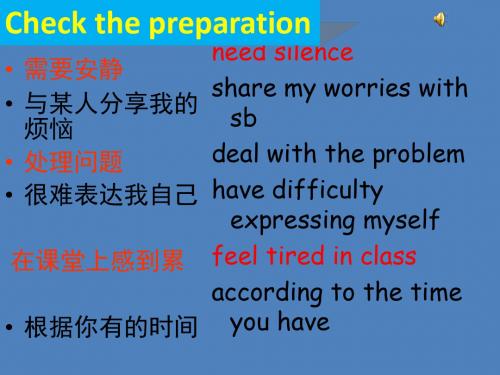
Do you like him?
.
I
am
thi由nk连in词gwahbeotuhte_ri_,f/_ifw_引_h_e导_th的_e_宾r_语_yo_从u__句li_k_e_h_i.m?
Sandy: Good idea. But I don’t know what films are on now.
Millie: I don’t want to see any films. Amy: (3)__W__h_a_t_a_b_o_u_t_ going to the new museum? My dad
I need silence when I’m
studying. I don’t know _w_h_e_r_eI
can find a quiet place.
Peter
I neepdrsoonm. e谁on(e宾to格sh)are
my worries with. I wonder _w_h_o_/_w__h_o_m_ I should go to for help. n. 担心,令人担忧的事
Work out the rule
口诀:bwTehPh一-aepqyr随wuodeoani主sfrtotdftuieoenorn二nre.t(dn人i随etorn称f宾rinto代omt第词hpee三)rcslt人aohunas称taeli不snhao更uld新
Wang Junkai’s second problem
主句是过去的某种时态, 从句一定要用相对应的过去的某种时态。
eI.ng.the past WangJunkai wondered whether Inhthee_cp_oa_us_ltd_W__a(ncganJ/ucnokualidd)fiidnnd’takqnuoiewt tphlaatce. lHigehttrtieradvheils bmeuscth, bfuasttheretdhiadnn’stounde. rstand why he still __g_o_t__(get/got) low marks. 注意:宾语从句表述的是客观真理、自 然现象等时,从句都要用一般现在时。
牛津译林版九年级英语上册 Unit 3 Teenage problems Grammar 教学设计

牛津译林版九年级英语上册Unit 3 Teenage problems Grammar 教学设计9A Unit 3 Teenage problems【Teaching contents】Grammar【Teaching aims】To learn object clauses introduced by question words. To learn how to give suggestions.Talk about teenage problems with object clauses introduced by question words.【Teaching important and difficult points】To learn object clauses introduced by question words.To learn how to give suggestions.【Teaching methods】Communicative Approach, situational Method 【Teaching procedures】Tape-recorder, Multi-mediaPart One Revision (Translation)First, ask the students to try to translate the following sentences:1. 我想知道我该做什么。
2. Daniel不知道他该和谁交谈。
3. 有时我们忘记我们应该什么时候停止。
4. 我不能理解为什么他们对我如此严格。
5. 我不知道我该怎样处理这个问题。
Part Two Object clausesStep 1 Read and find1. Check the answer and pay attention to the structure.2. Read the sentences of Part A on Page 40 find the object clauses.Step 2 PracticeStudents are talking about their problems. Help them complete each object clause below with a correct question word.Finish the exercise in part A1 and read the object clauses.Step 3 Work out the rule1.从句中要用陈述语序而不用疑问语序,即引导词+主语+谓语+其他。
Unit3Grammar课件牛津译林版英语九年级上学期

广西其他地市3年真题精选(2018~2020)
3. (2020贵港44题)—I wonder ___C_____.
—Only seven dollars. All the books were on sale in that bookstore yesterday. A. how many books you bought B. where did you buy these books C. how much you spent on these books D. when you bought these books
Daniel does not know whom he should talk to.
Sometimes we forget when we should stop.
I do not understand why they are so strict with me.
I do not know how I should deal with the problem.
9. (2019百色34题)—I want to know ____A____ we will have the
meeting.
—Maybe in the classroom.
A. where B. when
C. who
D. whether
增补训练
10. —Could you tell me ____B____?
• Why not do sth.? 为什么不做某事? • =Why don’t you do sth.? 你/你们为什么不做某事? • What/How about doing sth.?做某事怎么样? • Let’s do sth.让我们做某事。 • Shall we do sth.? 我们做某事好吗? • Perhaps you should do sth. 或许你应该做某事。 • Would you mind doing sth.?你介意做某事吗? • You’d better (not) do sth. 你最好(不)做某事
- 1、下载文档前请自行甄别文档内容的完整性,平台不提供额外的编辑、内容补充、找答案等附加服务。
- 2、"仅部分预览"的文档,不可在线预览部分如存在完整性等问题,可反馈申请退款(可完整预览的文档不适用该条件!)。
- 3、如文档侵犯您的权益,请联系客服反馈,我们会尽快为您处理(人工客服工作时间:9:00-18:30)。
初中英语牛津译林版九年级上册Unit3《Grammar:Object clauses introduced by question words&Giving suggestions》优质课公开
课教案教师资格证面试试讲教案
1教学目标
To learn object clauses introduced by question words.
To learn how to give suggestions.
Talk about teenage problems with object clauses introduced by question words.
2学情分析
3重点难点
To learn object clauses introduced by question words.
To learn how to give suggestions.
4教学过程
4.1第一学时
教学活动
1【讲授】9A Unit3 Grammar
Part One Revision (Translation)
First, ask the students to try to translate the following sentences:
1. 我想知道我该做什么。
2. Daniel不知道他该和谁交谈。
3. 有时我们忘记我们应该什么时候停止。
4. 我不能理解为什么他们对我如此严格。
5. 我不知道我该怎样处理这个问题。
Part Two Object clauses
Step 1 Read and find
1. Check the answer and pay attention to the structure.
2. Read the sentences of Part A on Page 40 find the object clauses.
Step 2 Practice
Students are talking about their problems. Help them complete each object clause below with a correct question word.
Finish the exercise in part A1 and read the object clauses.。
